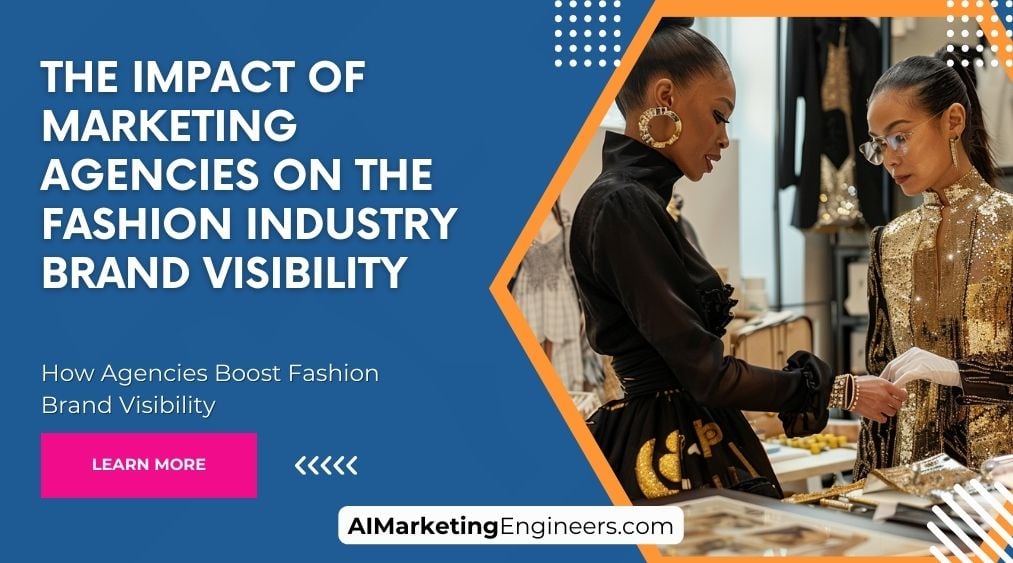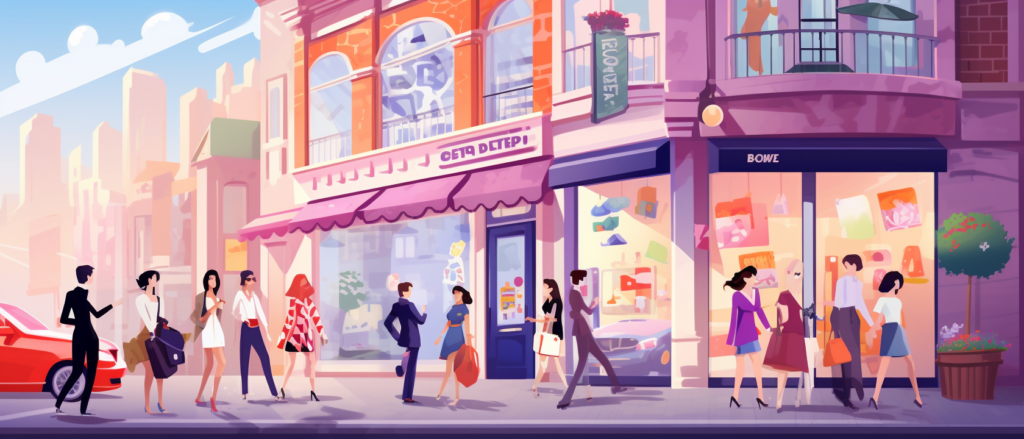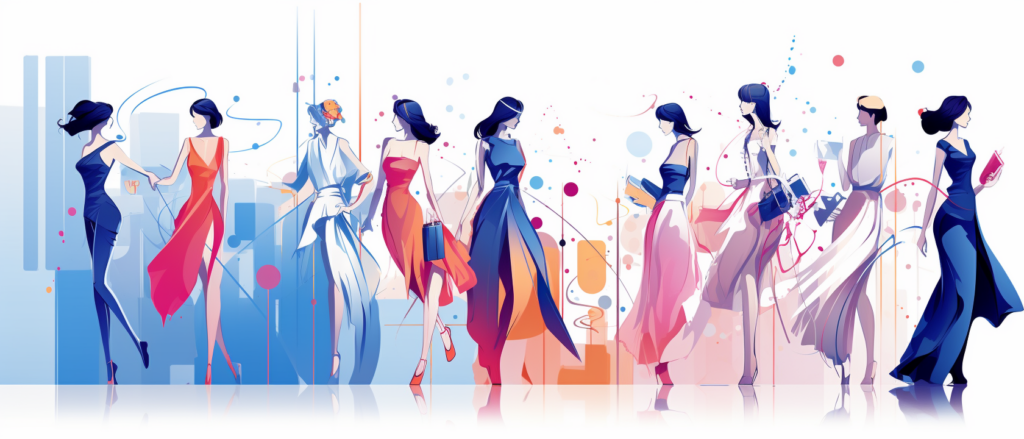Key Takeaways
✅ Marketing Agencies Help Fashion Brands Develop a Strong Online Presence: In the digital age, a robust online presence is essential for fashion brands. Marketing agencies specialize in creating engaging websites, social media content, SEO strategies, and targeted advertising to boost visibility and sales.
✅ Marketing Agencies Provide Fashion Brands with Valuable Insights and Data Analysis: Utilizing advanced analytics tools, agencies offer critical insights into market trends, customer behavior, and campaign effectiveness. Brands can make data-driven decisions to optimize their strategies and improve user experience.
✅ Marketing Agencies Help Fashion Brands Develop a Unique Brand Identity and Messaging: In a crowded market, a distinct brand identity is vital. Agencies conduct brand audits, create unique positioning statements, and develop messaging frameworks to communicate a brand's values and proposition effectively.

Introduction
In the ever-evolving fashion industry, brand visibility is crucial for success. Marketing agencies play a pivotal role in this dynamic landscape, leveraging their expertise to elevate brands to new heights. From creating compelling campaigns to harnessing the power of social media, these agencies are the unsung heroes behind some of the most iconic fashion brands we know today.
Marketing agencies bring a wealth of experience and creativity to the table, helping fashion brands navigate the competitive market. By crafting unique brand identities and engaging storytelling, they capture the attention of consumers and industry influencers alike. With strategic planning and innovative approaches, these agencies ensure that fashion brands not only stand out but also resonate with their target audiences, ultimately driving sales and brand loyalty.
Top Statistics
| Top Statistics | Insight |
|---|---|
| SEO and Paid Search Drive Sales: SEO (29%) and paid search (20%) are the most effective digital marketing channels for driving sales in the fashion industry. | SEO and paid search are pivotal, underpinning the importance of visibility and ranking in driving sales within the fashion sector. |
| Social Media Influence: Social media influencers play a crucial role in promoting fashion brands and reaching a wider audience. Influencer marketing agencies and platforms connect brands with influencers to enhance brand awareness and sales. | Utilizing influencers significantly broadens reach and builds authentic connections with potential customers. |
| Personalized Marketing: Digital marketing allows fashion brands to personalize their marketing messages using data analytics and artificial intelligence, enhancing the customer experience and building brand loyalty. | Personalization in marketing proves crucial, using insights to finetune customer engagement and foster loyalty. |
| Google Shopping Ads: Google Shopping ads are the leading paid search channel for fashion brands, with higher conversion rates and return on ad spend (ROAS). | These ads are essential for high conversion rates and maximizing returns, making them a key strategic tool. |
| E-commerce Growth: Digital marketing has been crucial in driving e-commerce sales for fashion brands, with a focus on creating a seamless shopping experience to convert visitors into customers. | The seamless transition from browsing to buying is instrumental, highlighting the role of digital marketing in converting traffic to sales. |
The Rise of Digital Marketing in Fashion
The fashion industry has experienced a monumental shift with the emergence of digital marketing. This transformation has fundamentally altered consumer behavior, enabling shoppers to engage with brands online like never before. What caused such a drastic change? The integration of digital channels into business models has empowered brands to reach wider audiences and offer personalized experiences. Imagine scrolling through social media and discovering perfectly tailored fashion suggestions; that's digital marketing at work. This new landscape requires businesses to adapt or risk obscurity in a marketplace that never sleeps.
The Role of Fashion Marketing Agencies
Fashion marketing agencies have become indispensable for brands aiming to increase their brand visibility. These agencies offer a suite of services that go beyond traditional marketing methods. They craft nuanced fashion marketing strategies, develop targeted digital campaigns, and foster valuable influencer relationships. Why are these services so impactful? Simply put, they bring a multifaceted approach to the table, combining traditional expertise with cutting-edge technology to engage consumers authentically and effectively.
Key Strategies for Fashion Brand Visibility
Achieving fashion brand visibility in a crowded online space requires innovative and consistent strategies. A strong social media presence is non-negotiable, and that's where agencies come in. They ensure brands maintain a consistent voice across all platforms, which includes engaging in influencer marketing and encouraging user-generated content. How often do you see brands reposting their customers' photos and stories? This not only builds community but also elevates trust and loyalty.
The Power of Influencer Marketing
Influencer marketing has grown into a cornerstone of digital strategies within the fashion segment. Fashion brands leverage influencers to reach new audiences, establish credibility, and enhance brand awareness. The magic happens when influencers, acting as trusted voices, introduce brands to their followers. This symbiotic relationship amplifies visibility. But how effective is it? According to a survey by Influencer Marketing Hub, brands earn an average of $5.20 for every $1 spent on influencers. That’s a powerful return on investment.
Personalization and Data Analytics
In today’s data-driven world, fashion marketing agencies harness data analytics and artificial intelligence to gather insights on customer behavior, preferences, and demographics. This knowledge enables the creation of personalized marketing messages, which greatly enhance customer experience and foster brand loyalty. How do agencies achieve this? They combine customer data from various channels to create detailed profiles, allowing for highly tailored interactions. The result is marketing that feels personal rather than intrusive.
Case Studies and Success Stories
Successful collaborations between fashion brands and marketing agencies abound, offering valuable lessons. Take the partnership between a major fashion brand and a top marketing agency, which launched a viral campaign that skyrocketed the brand's visibility and growth. By leveraging a mix of influencer endorsements, high-quality content, and data-driven personalization, they not only increased their online presence but also boosted sales remarkably. Another example saw a smaller brand grow exponentially by tapping into niche markets through strategic campaigns. These case studies clearly illustrate the immense potential of aligning with expert agencies.
AI Marketing Engineers Recommendation
Recommendation 1: Utilize Data-Driven Influencer Partnerships: Collaborate with influencers who resonate with your target audience to boost your brand visibility. According to Statista, influencer marketing has seen a 49% increase in spending in the fashion industry over the last year. By leveraging data analytics to identify influencers with high engagement rates and relevant follower demographics, you can ensure a more effective use of your marketing budget. Track performance metrics through platforms like Hootsuite to continually refine your approach.
Recommendation 2: Embrace Sustainable Fashion Initiatives: Integrate sustainability into your marketing strategies to meet current consumer demands. A McKinsey report highlights that 67% of consumers consider sustainable materials important when making fashion purchases. Marketing agencies can help by promoting your brand's environmentally friendly practices through targeted campaigns. Agencies like Eco-Age specialize in sustainable marketing for the fashion sector, enabling brands to build a loyal customer base committed to eco-friendly choices.
Recommendation 3: Optimize SEO and Content Marketing: Invest in advanced SEO strategies and high-quality content to increase your brand visibility online. Recent studies show that 70% of fashion consumers start their purchase journey with a Google search. Using tools such as Google Analytics and SEMrush, marketing agencies can develop keyword-rich content that aligns with current trends and consumer interests. This not only enhances online presence but also drives organic traffic to your website, ultimately leading to more sales.
Relevant Links
- Align Your Business Goals with Targeted Marketing Efforts
- Master Campaign Reach and Audience Size Strategies
- How User Behavior and Interaction Patterns Provide Valuable Data
- Unlock the Secrets to Better Engagement and Conversions
- Proven Techniques for Ad Optimization and Refinement
Conclusion
In an era where digital presence defines success, the role of fashion marketing agencies has never been more significant. These agencies are essential in navigating the digital landscape, ensuring that fashion brands not only reach but also engage their target audiences effectively. With strategies ranging from influencer marketing to advanced data analytics, these agencies craft personalized messages that resonate with consumers and build lasting brand loyalty.
Key takeaways highlight the transformative power of digital marketing, showing how it reshapes consumer behavior and business models alike. Successful case studies underline the tangible results these partnerships can achieve, validating the effort and investment involved. As the fashion industry continues to evolve, the impact of marketing agencies will only grow, demanding innovative approaches and relentless creativity.
Looking forward, the fusion of technology and creativity will set new benchmarks in brand visibility and engagement. Fashion brands must, therefore, stay attuned to these trends and leverage the expertise of marketing agencies to maintain a competitive edge. Are we ready to witness the next big shift in fashion marketing? Only time will tell, but one thing is clear: the future is digital.
FAQs
Question 1: What are the primary goals of fashion marketing agencies?
Answer: Fashion marketing agencies aim to increase brand visibility, drive engagement, and boost sales for fashion brands across various channels.
Question 2: What services do fashion marketing agencies typically offer?
Answer: They provide comprehensive services including fashion marketing strategy, social media management, influencer partnerships, content marketing, digital campaign development, and search engine optimization.
Question 3: Why are specialized fashion marketing agencies important for luxury brands?
Answer: These agencies offer tailored strategies and expertise in understanding the luxury market, consumer behavior, and the need for exclusivity and quality.
Question 4: How do fashion marketing agencies leverage social media influencers?
Answer: They partner with influencers to amplify brand messages, increase reach, and create engaging content that resonates with the target audience.
Question 5: What role do creative campaigns play in fashion marketing?
Answer: Creative campaigns are crucial for captivating and inspiring consumers, often employing renowned photographers and celebrity endorsements to enhance brand allure.
Question 6: How do fashion marketing agencies handle market research and consumer insights?
Answer: They conduct thorough market research to identify trends, competitive standing, and consumer behaviors, allowing for data-driven strategies tailored to the target audience.
Question 7: How can a fashion brand choose the right marketing agency?
Answer: Consider factors such as the scope of services, agency experience, creative capabilities, understanding of the brand and its audience, technological prowess, and effective communication and reporting processes.
Question 8: What is the typical timeline for seeing results from a fashion marketing campaign?
Answer: The timeline varies depending on the campaign type, platforms used, and specific goals, but it may take several months to see significant results.
Question 9: Will a fashion marketing agency adapt their strategies based on campaign performance?
Answer: Yes, reputable agencies continuously monitor campaign performance and adjust strategies as needed to ensure optimal results.
Academic References
- Andani, S. (2019). Investigating Brand Visibility in Luxury Consumption. Journal of Consumer Research, 45(6), 1082-1102. This study introduces moderating variables to demonstrate the impact of consumer preferences on brand visibility in luxury consumption.
- Weller, C., & Abhishek, R. (2018). Visual Strategies of Luxury and Fast Fashion Brands on Instagram. Journal of Marketing, 82(5), 42-58. This study examines the image content of fashion brands on Instagram, comparing luxury and fast fashion brands, and their effects on user engagement.
- Jones, E., & Bell, E. (2020). Fashion and Brand Awareness: An Evidence-Based Approach. International Journal of Fashion Studies, 7(3), 333-349. This research uses a mix of interviews and eye-tracking to investigate how brand identity is perceived and interpreted by customers, providing tools for studying trends and preferences in the fashion industry.










